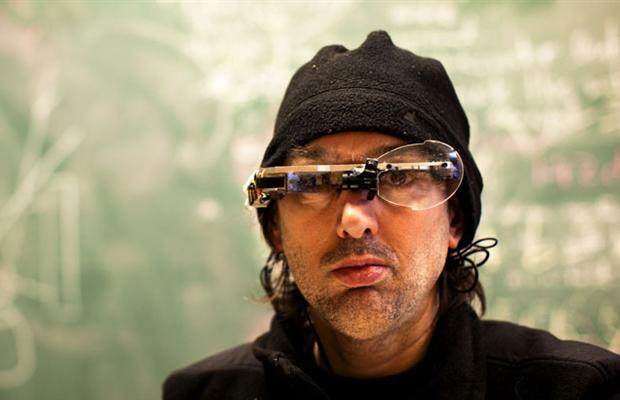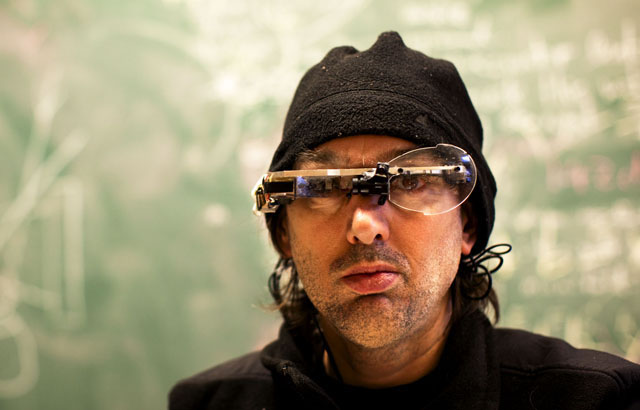Part VI: Everyone’s watching
A pioneering ‘cyborg’ says turning the tables — and cameras — on Big Brother is the answer.
OTTAWA — In a world in which surveillance is pervasive, is it possible we could restore the balance of power and regain control of our lives by watching the watchers — and one another as well?
That’s the provocative and perhaps counter-intuitive thesis of Steve Mann, a University of Toronto professor who’s been described as the world’s first cyborg for his pioneering work in the field of wearable computing.
Mr. Mann is a passionate advocate of “sousveillance,” a word he coined from French roots that literally means to watch from below. Surveillance, by contrast, means to watch from above.
Sousveillance, he says, is “human-centric.” People engage in sousveillance when they record pictures or video of the people, places and events around them. Cameras mounted on lampposts or buildings, on the other hand, are by definition surveillance devices.
It’s not that Mr. Mann disapproves of surveillance, per se. In fact, he makes no value judgment about it. But its dominance has produced an imbalance that tilts power unfairly toward the institutions and agencies that watch us, he says.
“When you have a situation that is extremely unbalanced, which we’ve never had before throughout recorded history, you have a dangerous situation,” Mr. Mann says.
The solution, he argues, is “equiveillance,” another word he invented — a state of equilibrium between surveillance and sousveillance.
“What’s good for the goose is good for the gangster,” Mr. Mann quips. “If you’re going to watch the gangster, you should watch the goose. Sousveillance creates a more fair and balanced form of veillance. I think we’d be living in a better society.”
Sousveillance has grown as people have acquired camera phones, digital cameras and other mobile devices. It even has it’s own designated day: since 1998, activists have marked Dec. 24 as World Sousveillance Day.
An early instance of sousveillance was the 1991 Rodney King tape, in which a bystander videotaped Los Angeles police officers repeatedly striking Mr. King with their batons.
More recent examples include the photos of American solders humiliating inmates at Abu Ghraib prison in Iraq and last year’s video of the fatal Tasering of Robert Dziekanski by RCMP officers at the Vancouver airport. Both images sparked international protests.
But the value of sousveillance goes far beyond such celebrated, but relatively rare, incidents, Mr. Mann maintains. For him, sousveillance is a lifestyle, a way of recording your whole life. And he is its chief evangelist.
Mr. Mann has created a free website, glogger.mobi, that broadcasts live pictures and videos submitted by 35,000 “cyborgs” to their personal Web pages, blogs and social networking sites. Its declared purpose is to bring personal imaging to the masses.
In a 2006 blog entry he co-authored with University of Ottawa professor Ian Kerr, Mr. Mann argued sousveillance could act as a kind of ombudsperson — “a vehicle through which individuals can exercise complaints and mediate fair settlements more effectively against large and powerful entities.”
Balancing surveillance with sousveillance might even result in a purer form of democracy, one in which respect, power and participation are well distributed and shared, he maintained.
Ron Deibert, director of the Citizen Lab at the University of Toronto’s Munk Centre, says Mr. Mann’s concept turns the idea of surveillance on its head.
“That means quite literally adopting the techniques and methods of state intelligence, but using them for purposes of human security instead of national security, controlled by citizens instead of intelligence agents,” he says.
“To me, that notion of being informed and watching is the only hope for liberty in an age where you have such massive surveillance.”
But David Lyon, a leading expert in surveillance studies at Queen’s University in Kingston, says sousveillance by citizens is no match for the scale of surveillance by governments, corporations and law enforcement agencies.
“The very thought that somebody, by turning a camera on a shopping mall or street, is in some way demonstrating a counterweight is risible,” he scoffs.
Even a sympathizer like Mr. Kerr, Canada Research Chair in ethics, law and technology, has trouble swallowing Mr. Mann’s argument.
“There’s an appeal to the formula sousveillance plus surveillance equals equiveillance,” he concedes. “But when you dig down deeper, there are a number of questions about privacy, equality and power that aren’t captured.”
Even Mr. Mann’s critics concede that sousveillance can sometimes expose abuses by authorities. But, says Mr. Lyon, “I still think of them as isolated opportunities compared with the constantly accelerating growth of surveillance systems.”
Mr. Mann has been working through his ideas about sousveillance for many years, and has invented numerous devices to enable it. He’s rarely seen without glasses containing his EyeTap technology, which records and digitally modifies everything he sees.
Eventually, wearable computers such as EyeTap will become as ubiquitous as shoes and clothing, Mr. Mann predicts, allowing each of us to compile a complete video record of our lives. Without such a record, he says, we’re at the mercy of the authorities who scrutinize us.
To Mr. Kerr, the thought of recording everything we see is troublesome.
“My suspicion is we would give up at least as much as we would gain, and I suspect more,” he says. “I think we would give up a large portion of our humanity.”
People assume that keeping records will benefit them, says Jane Bailey, a law professor at the University of Ottawa, but records can be interpreted in different ways. They can also be subpoenaed and are subject to search warrants, she points out. “I don’t think a lot of people stop and think about what that would mean.”
What’s really up for grabs is ubiquitous surveillance, Mr. Kerr says. If everyone is wearing recording devices, it won’t be long before we’re required by law to leave them on at all times.
“In a risk-based society, if we had that capability, why wouldn’t we?”
Another problem with sousveillance, says Ms. Bailey, is that a lot of innocent victims — people wandering blindly into the path of a sousveillance camera — get caught in the video crossfire.
Mr. Mann and other activists have employed sousveillance techniques to confront surveillance cameras deployed by retailers, a tactic he calls “inverse surveillance.” They’ve found that aiming a camera at a business’s CCTV cameras invariably provokes a quick and hostile response.
But Ms. Bailey points out that activists usually end up dealing with low-level employees like clerks and security guards.
“Sousveillance of a corporation is never really sousveillance of the power centre,” she says. “It’s ordinary people who work in the store.”
That raises the question of whether it’s really possible to conduct sousveillance in a way that’s genuinely threatening to power, she says.
Moreover, adds Mr. Kerr, sousveillance runs counter to the established principles of privacy law, including obtaining consent from those photographed and limiting the retention of data. “Now, with this set of practices, the idea in fact is to have a lifelong archive.”
Mr. Mann believes surveillance would decrease if more of us practised sousveillance. “I’m not saying it’s going to get rid of it,” he cautions, “but it might shift the equilibrium a bit.”
Mr. Kerr is skeptical. “The only way I can imagine that scenario working is if the authorities have access to your records. I don’t think of that as an improvement.”
He’s also concerned that widespread sousveillance will further undermine legal privacy rights. One of the legal benchmarks for measuring privacy invasion is the notion of a “reasonable expectation” of privacy. But if sousveillance becomes ubiquitous, “there’s a risk that it’s a one-day downward ratchet in expectations,” Mr. Kerr says.
Mr. Lyon likes some of the things Mr. Mann is doing. He likens them to Greenpeace tactics.
“But I certainly don’t think the development of ubiquitous computing is going to become the means of widespread questioning of surveillance,” he says. “I think it’s precisely the opposite, because these things are going to disappear.”
© Copyright (c) The Ottawa Citizen

University of Toronto professor Steve Mann, who’s been described as the world’s first cyborg for his pioneering work in the field of wearable computing, says sousveillance is a lifestyle, a way of recording your whole life.
Photograph by: Kaz Ehara, for The Ottawa Citizen
The Ottawa Citizen Headline News
Sign up to receive daily headline news from The Ottawa Citizen.
Ads by Google
Union Targeting You? Corporate Video & Web Resources We understand Canadian Campaigns! www.projectionsinc.com
Free Credit Report Canada Free Credit Report and Credit Score for Canadians in just 60 seconds FreeCreditReportsinCanada.ca




















